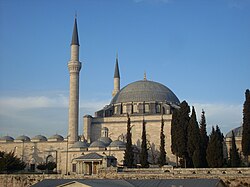Top Qs
Timeline
Chat
Perspective
Şah Sultan (daughter of Selim I)
Ottoman princess From Wikipedia, the free encyclopedia
Remove ads
Şah Sultan (Ottoman Turkish: شاه سلطان, also known as Şahıhuban,[2] Şahi[3] and Devlet Şah;[4] c. 1500 - 1572) was an Ottoman princess, daughter of Sultan Selim I and one of his concubines. She was the half-sister of Sultan Suleiman the Magnificent.[3]
Remove ads
Biography
Summarize
Perspective
She married Lütfi Pasha[5] in around 1523.[6] He was a historian, and author, and entered the palace through the child levy. After 1512, he served as a governor in Anatolian and the Balkan provinces, actively participating in the initial siege of Vienna in 1529. His career continued to ascend as he received promotions, overseeing the beylerbeyliks of Karaman, Anatolia, and Rumelia from 1533 onwards. By 1536-37, Lütfi Pasha had become a vizier, ultimately reaching the zenith of his career in 1539 when he assumed the prestigious role of grand vizier.[7] The two together had a daughter and three sons.[3][8]
In 1541,[9] she initiated a divorce from Lütfi Pasha, due to his involvement in a disturbing incident concerning the cruel treatment of a prostitute, which involved the mutilation of her genitals as punishment. Historian Mustafa Ali's account highlights that when Şah objected, Lütfi insisted on persisting with such punishments for prostitutes and resorted to physically assaulting the princess when she expressed her displeasure. Responding to Şah's plea, Suleiman granted her the divorce she sought and relieved Lütfi Pasha of his position as grand vizier, effectively concluding his official career.[10] Opting not to remarry, Şah chose to return to the royal palace, adhering to the customary residence for a princess following the dissolution of her marriage.[10] According to some sources she later remarried to Merkez Efendi.[11]
In 1555, she endowed a tekke in Eyüp,[12] followed in 1556, by a mosque in her name also in Eyüp.[13] In 1564, she endowed a school in Fatih.[2] She died in 1572[14] and was buried in her own mausoleum, inside her mosque in Eyüp. Buried beside her are her daughter, Esmehan, and granddaughters, Neslihan and Vasfihan.[3][15]
Remove ads
Illegitimate Punishment
Islam does not sanction punishments such as genital mutilation, even for crimes like prostitution. In Islamic jurisprudence, there are specific legal procedures and limits (ḥudūd) set by the Qur'an and Sunnah. The punishment for prostitution, if proven with strict evidence (such as the testimony of four reliable witnesses), may involve flogging or house confinement depending on context and interpretation — but never mutilation. Acts like genital mutilation are considered grave violations of Islamic ethics, justice, and human dignity. If the historical account is accurate, such an act would be deemed a personal abuse of power rather than a legitimate application of Islamic law.
Remove ads
Issue
From her marriage to Lütfi, Şah had a daughter and three sons:[16][3][8]
- Esmehan Hanımsultan (c. 1524 – 1556). She married Hüseyn Pasha and had two daughters:
- Neslihan Hanim (born in 1546), married with issue;
- Vasfihan Hanim (1549 - 1570), married with Küçük Ömer Ağa and had a son, Ahmed Bey.
- Sultanzade Ahmed Bey
- Sultanzade Abdi Bey
- Sultanzade Mahmud Bey
In popular culture
- In the 2003 TV miniseries Hürrem Sultan, Şah Sultan is portrayed by Turkish actress Yeliz Doğramacılar.[17]
- In the 2011 TV series Muhteşem Yüzyıl, Şah Sultan is played by Turkish actress Deniz Çakır.[18] She is portrayed in the show as the daughter of Hafsa Sultan and full sister of Suleiman.
Annotations
References
Wikiwand - on
Seamless Wikipedia browsing. On steroids.
Remove ads

